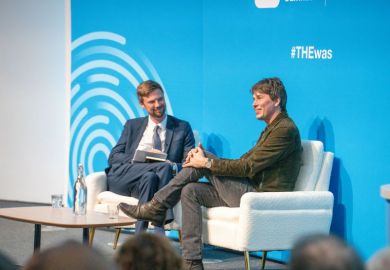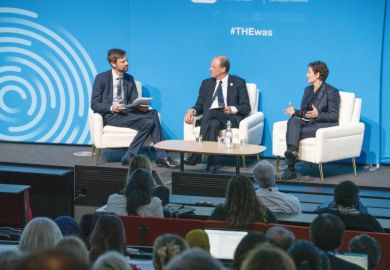The annual Times Higher Education World Academic Summit is an opportunity to gauge the temperature of the water in which universities swim, as well as the threats lurking in the depths.
The topics discussed are partly determined by the summit theme – this year, universities’ role in civil society – but also by the issues that are keeping university leaders awake at night.
At this year’s summit, held at the University of Manchester, the parlous state of funding in the UK was a prominent talking point – a fact acknowledged by the skills minister, Jacqui Smith.
Interestingly, she described the financial crisis facing the sector as a “short-term” challenge, which she said was coupled with the longer-term need to deliver broader reforms.
This was interpreted by some present as an indication that a tuition fee cap linked to inflation, as well as additional maintenance support, was a likely next step.
Beyond funding, though, a recurring theme was the importance of curiosity-driven research, at a time when value for money and demands for impact often dominate debate.
It was a topic picked up by many of the summit speakers, among them Sir Andre Geim, the Nobel laureate who discovered graphene at Manchester, who described how quickly his scientific breakthrough turned into a feeding frenzy.
“Once I was on a boat trip and we watched a school of dolphins – they decided to play with humans, and they were very close to the boat,” he said.
“They were close enough to touch had we wanted to, so everyone leaned over the side of the boat, and you can imagine it was a magic moment – mesmerising, everyone was in awe.
“Then a little boy behind shouts, ‘Mum, can we eat them?’
“It reminded me of the early days when graphene came in very small flakes, and we were starting [to explore] those wonder properties that people hadn’t seen in condensed matter before.
“And people pushed and pushed, [asking]: ‘Can we eat it?’ and ‘What’s useful about this material?’ And I said, I am not responsible for applications. I try my best to push my PhD students…but we know application takes time.”
Dame Nancy Rothwell, the former vice-chancellor of Manchester, recalled a conversation with George Osborne, who had then recently stepped down as chancellor of the Exchequer, in which she and Geim asked why he had been so supportive of science – was it for economic reasons? “He said, ‘No, I can say this now, it’s because any advanced nation should value the importance of knowledge and discovery,’” Rothwell said.
Geim said this was “very good, but especially important was that he said ‘I can say this now’, because he had just resigned – it is not very popular to support fundamental science when people ask for bread and circuses.”
He said his view was that science was a “pyramid, the foundation of which is basic research, and if we were to pull out basic research, everything would crash down”.
An equally impassioned defence of fundamental science came from fellow physicist Brian Cox, who combines his roles as a professor at Manchester and the Royal Society with his work as a science communicator and maker of BBC documentaries about space.
“The way I look at science – and this is not the way I would explain it to the Treasury – is you’ve got a load of people who are being paid to wander around on the edge of the known,” he said.
“That’s what your job is. And occasionally those random walks, that Brownian motion, will lead to something that transforms civilisation. There are so many examples, and most of them are serendipitous.”
A concluding word came from Irene Tracey, vice-chancellor of the University of Oxford, who said a defining feature of universities is that they “don’t do easy: we do the really difficult stuff”.
“Universities are places where people can go off and for years think about things that you wouldn’t imagine it is possible to think about,” she said.
“That helps us understand the beauty of the universe and how our planet is working and what it is to be human.
“That pure discovery is something we tend to be shy about talking about, because it can be hard to get grants to support it, and so we have to say it has impact.
“But I think society gets it maybe more than some politicians – that it is really important we have that pure discovery, and that to push the boundaries of knowledge is deeply human.”
Register to continue
Why register?
- Registration is free and only takes a moment
- Once registered, you can read 3 articles a month
- Sign up for our newsletter
Subscribe
Or subscribe for unlimited access to:
- Unlimited access to news, views, insights & reviews
- Digital editions
- Digital access to THE’s university and college rankings analysis
Already registered or a current subscriber?







